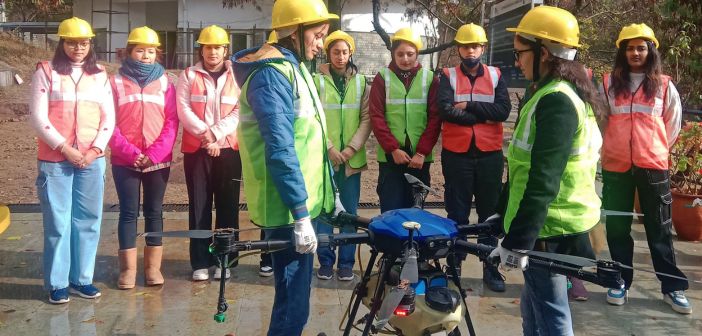The Drone Didi program, offered under the Pradhan Mantri Kaushal Vikas Yojana (PMKVY) scheme, represents a collaborative effort between I-Hub at IIT Mandi and HCI Foundation. This pioneering endeavor aims to empower women through the utilization of drone technology, equipping them with the necessary skills to operate drones, with a special emphasis on applications in agriculture. By providing training not only in drone operations but also in entrepreneurship, Drone Didi opens doors to new opportunities and fosters inclusivity in various industries.
To learn more about the groundbreaking of the Drone Didi program, the vision for empowering women through drone technology, drone training, skills to operate drones, and more, we spoke with Mr. Somjit Amrit, CEO of I-Hub at IIT Mandi, Ms. Volga Verma, General Manager at I-Hub at IIT Mandi, and Mr. KB Rajendran, Advisor for Skill Development and Entrepreneurship at I-Hub.
Below are a few excerpts from our conversation. You can watch the full video on our YouTube channel.
Vision for Empowering Women Through Drone Technology
Mr. Somjit Amrit spoke about the multifaceted approach of their technology initiative, emphasizing the crucial human-drone interface.
The four key areas of focus:
- Translation research
- Skill development
- Industry collaboration
- Startup incubation
Mr. Somjit Amrit highlighted the importance of addressing the expanding growth of drones by providing vocational training in various areas, including drone operations, solar PV panel installation, the Internet of Things, AI, and ML. Mr. Somjit Amrit emphasized that while the Drone Didi program is a significant aspect, it represents just one part of their broader efforts to empower women in technology and foster inclusivity. Additionally, he underscored their focus on entrepreneurship development through the program.
Empowering Women in Agriculture Through Drone Technology: Implementation under PMKVY
Mr. KB Rajendran spoke about the execution of the program under PMKVY, facilitated by a partnership with NSDC and the Agriculture Skill Council of India. He detailed the skills taught, including drone operation, DGCA flight rules, and pesticide spraying for agricultural crops. Mr. KB Rajendran emphasized the importance of entrepreneurship training, covering business skills, financial literacy, and marketing, facilitated through a partnership with MeraBizNet. Additionally, he outlined support activities such as credit linkages, market linkages, and mentorship to empower women entrepreneurs in the drone industry.
The First Batch of Training under the Drone Didi Program
Mr. Somjit Amrit highlighted the combination of emotions experienced upon completing the first batch of the program. He shared insights into three key criteria for success: mobilizing a full cohort of women, achieving a 100% pass rate in exams evaluated by government evaluators, and ensuring job placements for both candidates from earlier batches. Mr. Somjit Amrit credited the trainers and the Center for Artificial Intelligence and Robotics at IIT Mandi for their crucial support. Despite wishing for higher numbers, he emphasized the importance of maintaining quality and protecting the integrity of the program. Mr. Somjit Amrit expressed satisfaction with the program’s success and expressed optimism about its future scalability and impact with continued support.

Exploring the Technical Aspects of Drone Training
Ms. Volga Verma outlined the eligibility criteria for the program, stating that women who are 10th pass and at least 17 years old are eligible, with a minimum job entry age of 18 years. She highlighted the program’s diversity, with participants from different states like Punjab and Maharashtra. The program is a three-month residential training program, totaling 390 hours, with 120 hours dedicated to theory, 150 hours for practical training, and 120 hours for on-the-job training. Ms. Volga Verma emphasized the comprehensive nature of the training, covering theoretical modules and practical aspects such as assembly, flight simulation, repair, and maintenance. She highlighted the importance of on-the-job training conducted in the drone lab of IIT Mandi, facilitated by the Center for Artificial Intelligence and Robotics.
Insights from the Participants in the Drone Didi Program
The participants spoke about their training experiences, sharing insights that could inspire other women to explore careers in drone technology. Ms. Sakshi, Ms. Sashi Bala, and Ms. Komal Thakur provided glimpses into their passions, ambitions for the future, and how the program aligned with their backgrounds and aspirations.
Ms. Sakshi from Pune, Maharashtra expressed her interest in media and entertainment, citing her need to understand drone technology for her career aspirations. She intends to utilize drones in her field and raise awareness about their applications. Reflecting on the training, Sakshi found it informative, learning the mechanics of drones and benefiting from practical sessions at IIT Mandi.
Ms. Sashi Bala, a BSc Agriculture student from Himachal Pradesh, discovered the program through Facebook ads, recognizing its alignment with her family’s agricultural background. Reflecting on the training, she found the practical sessions invaluable, gaining confidence in drone operations.
Also read: Why drone skills training is crucial for its application in various industries
Ms. Komal Thakur, hailing from Himachal Pradesh and pursuing a diploma in electrical engineering, shared her motivation for joining the program. She expressed her interest in starting a business related to drones, inspired by a family friend’s suggestion, and wanted to explore this opportunity further. Discussing her experience with the training, Ms. Komal Thakur stated, “I found the course informative, especially the practical training. It helped me understand drone operations better.”












